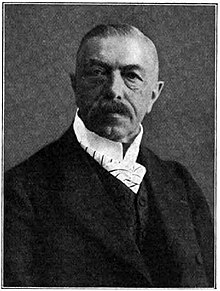Julius van der Zypen
Julius van der Zypen (born March 26, 1842 in Liège ; † August 9, 1907 in Berlin ) was a German engineer, industrialist and senior director of the company van der Zypen & Charlier .
Education and professional career
Born as the son of the factory owner Ferdinand van der Zypen (1816–1863), Julius van der Zypen first attended the technical colleges in Liège and Karlsruhe for his professional training . In Karlsruhe he became a member of the Teutonia fraternity . He broke off his studies in Karlsruhe in order to devote himself to the operation of the well-known railway car and machine factory van der Zypen & Charlier in Cologne-Deutz, which his father co-founded in 1845 . With his participation, the company gained such an upswing that at that time it could be counted among the largest plants of its kind not only in Germany, but even in all of Europe.
Until a few years ago before his death, van der Zypen remained at the head of the company as the oldest boss, until it was converted into a limited liability company and his son Ferdinand took over management, while he himself only remained a partner in the plant . Together with his brother, the later Kommerzienrat Eugen van der Zypen (1843-1910), Julius van der Zypen built the steelworks Gebrüder van der Zypen in Cologne-Deutz in 1868 , from around 1903 under his initial chairmanship and affiliation of the Wisser blast furnaces the Akt.-Gesellschaft Vereinigte Stahlwerke van der Zypen and Wissener Eisenhütten was formed, which under his successor Karl Grosse developed into the most modern tinplate plant in Europe by 1937 . In addition, some time later van der Zypen founded the Russian-Baltic wagon factory in Riga .
Industry associations
In 1877, the Association of German Railway Car Manufacturers was established under van der Zypen's leadership . As chairman he was in contact with the later head of the Reich Railway Authority Karl von Thielen and with the finance minister Johannes von Miquel . Van der Zypen also helped found the Danziger Waggonfabrik , which opened its business on October 1st, 1899 and marked the beginning of efforts to establish an industry in the east of the Prussian monarchy. For many years he was also a member of the supervisory board of the A. Schaaffhausen Bank Association .
Since 1881, Julius van der Zypen represented the common interests of the entire industry as the second chairman and, after the death of his friend, Eugen Langen , in 1895 , especially as the first chairman of the Association of Industrialists of the Cologne District . In this office, which he resigned in 1902 when he moved to Berlin for health reasons, he devoted both economic and socio-political questions to consideration. In addition, he was a member of the District Railway Council and, as long as he lived in Cologne, was a member of the Chamber of Commerce for a long time .
Julius van der Zypen entered the wider public by name in the summer of 1899. When he was invited to an international trade congress in Philadelphia , he responded by publishing a statement against the high tariffs in the United States . With the so-called Morrill Tariff , goods imported into the United States were cleared with 38% or even 48% duty. Van der Zypen later supplemented these remarks in a memorandum presented to the congress, which described the objections in German industrial circles.
politics
From 1886 to 1888 he was a member of the city council of the then still independent city of Deutz . After their incorporation, he was a member of the Cologne City Council for the Liberals from 1888 to 1903 .
Honors
Julius van der Zypen was one of the founders and board members of the German Fleet Association , whose successful Cologne office he set up. As an outstanding specialist, he was, among other things, a judge for railroad cars at the World Exhibition in Paris in 1900 and was awarded the Cross of the Legion of Honor for this. Two years earlier, van der Zypen, without having previously been a councilor of commerce, had been appointed secret councilor of commerce, a process which, as a very unusual honor, caused a sensation at the time. In addition, the Order of the Crown III was awarded to him by the Emperor during his presence in the Rhineland . Class awarded. Juliusstrasse in Cologne-Mülheim is named after Zypen .
literature
- Stahl und Eisen , Vol. 27 (1907), Part 2, ISSN 0340-4803
- Robert Steimel: Cologne heads . Self-published, Cologne 1958.
Individual evidence
- ^ Georg Kirschner: Directory of Members of the Karlsruhe Burschenschaft Teutonia , 1966.
- ↑ a b Ulrich S. Soénius (ed.), Jürgen Wilhelm (ed.): Kölner Personen-Lexikon. Greven, Cologne 2007, ISBN 978-3-7743-0400-0 , p. 599.
| personal data | |
|---|---|
| SURNAME | Zyps, Julius van der |
| BRIEF DESCRIPTION | German engineer and industrialist |
| DATE OF BIRTH | March 26, 1842 |
| PLACE OF BIRTH | Liege |
| DATE OF DEATH | August 9, 1907 |
| Place of death | Berlin |
